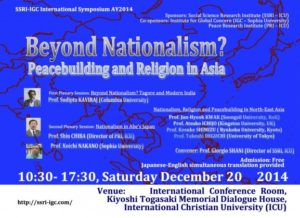34th Joint ICU-Sophia International Symposium held at ICU
The 34th Joint ICU-Sophia International Symposium was held on the ICU campus on December 20. This annual event, co-sponsored by ICU and Sophia University, brings together an international group of noted scholars to discuss specific interdisciplinary themes related to peace and conflict resolution. This year’s symposium was titled “Beyond Nationalism? Peacebuilding and Religion in Asia.”

The venue was the International Conference Room, Kiyoshi Togasaki Memorial Dialogue House at ICU. The symposium was sponsored by the Social Science Research Institute (SSRI – ICU), and co-sponsors included the Institute of Global Concern (IGC – Sophia University) and the Peace Research Institute (PRI – ICU). This symposium critically examined the prospects for peace in Asia by posing the following question: What can be done to counter the rise of nationalism within Asia and what role, if any, can inter-faith dialogue play in peacebuilding in the region?
As the main sponsor of these symposia, SSRI serves two main purposes: (1) to contribute to the world-wide networking for interdisciplinary social science research and information exchange; and (2) to promote partnership with local communities through public lectures and joint research projects. By inviting a global selection of leading academics from Japan, the US, the UK and the Republic of Korea, SSRI certainly fulfilled both purposes quite well.
The official program began with Opening Remarks from Prof. Junko Hibiya, President of ICU. Prof. Giorgio Shani, Director of SSRI at ICU, then gave his overview as Convenor of the symposium, detailing the speakers and their respective topics. Reflecting the diversity of ICU’s bilingual campus, speakers’ remarks were given in both English and Japanese, with simultaneous interpretation offered by professional staff members.
The Opening Plenary was chaired by Prof. Katsuhiko Mori of ICU. It began with a presentation by Prof. Sudipta Kaviraj of Columbia University, titled “Beyond Nationalism? Tagore and Modern India”. Professor Kaviraj focused on the question of Critical Nationalism and the writings of the Bengali poet and Nobel Laureate Rabindranath Tagore. According to Prof. Kaviraj, Tagore believed that “successful opposition to British colonial rule required the spread of a collective sentiment across the different social groups in Indian society: an anti-imperialist nationalism.” Tagore was wary of European-style nationalism, however, and wished to avoid the same type of governance in India. You can watch Professor Kaviraj’s presentation stating from the 25:00 mark in this video link.
The Second Plenary Session focused on the issue of “Nationalism in Abe’s Japan”, and was kicked off by Prof. Shin Chiba, Director of the Peace Research Institute (PRI) at ICU. Prof. Chiba focused on three main points: 1) Critiquing a series of measures such as the Abe Cabinet’s July 2014 decision on the use of “the right to collective self-defense”, arguing that these measures signify a ‘coup d’état’ against the Japanese Constitution on the part of the Abe administration. (2) Providing a critique of the Yasukuni nationalism of Prime Minister Abe and its defining features. (3) Examining the need for non-military security measures in East Asia today through recent developments of the theories and practices of peace-building, cooperative security, reconciliation and peace.
Prof. Chiba was followed by Prof. Koichi Nakano of Sophia University, who spoke on History, Politics and Identity in Japan. Prof. Nakano focused on the politics of national identity and how historical memory continues to play a key role in shaping the international relations of Northeast Asia today. His presentation sought to shed light on the challenges in the region through a critical analysis from a Japanese perspective. Professor Nakano examined this through what is often termed the “Yasukuni view of history” (Yasukuni shikan), and then provided an overview of the post-WWII question of historical narratives, with particular reference to the textbook issue.
The final group of presenters focused on the theme of Nationalism, Religion and Peacebuilding in North-East Asia :
Prof. Jun-Heok Kwak (Associate Professor, Songsil University, Republic of Korea)
Prof. Atsuko Ichijo (Associate Professor, Kingston University, UK)
Prof. Kosuke Shimizu (Professor, Ryukoku University)
Prof. Takeshi Deguchi (Associate Professor, University of Tokyo)
Discussants were Prof. Takashi Kibe (Professor, ICU) and Prof. Jae-Jung Suh (Senior Associate Professor, ICU). The Chair was Prof. Wilhelm Vosse (Professor, ICU). Following the conclusion of the presentations, a Joint Prayer was given by Prof. Juan Haidar, S.J. (Professor, Sophia University) and Prof. Johannes Unsok Ro (Senior Associate Professor, ICU). Closing remarks were given by Prof. Nina Hasegawa (Professor, Sophia University).
This 34th Joint ICU-Sophia International Symposium successfully continued the long tradition of critical, interdisciplinary analysis on relevant issues of peace and conflict resolution. By sustaining this key partnership between two of the most globally-focused universities in Japan, participants, students and members of the public are able to join in these timely and important discussions of how best to promote peace in our shared and often-conflicted world.



